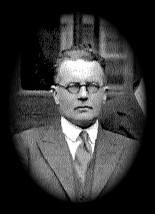 William Joseph McEldowney (1889-1967) was an accountant and lawyer before switching—in mid-life—to the Unitarian ministry. Raised among Methodists and Presbyterians, he was in his forties when he started attending Unitarian services in Wellington, New Zealand. Attracted to the ministry, he enrolled at Manchester College, Oxford in England. Unique in the British Unitarian movement, McEldowney was the only New Zealander trained at Manchester College who would remain in the United Kingdom his entire ministerial career. He served churches at Warwick, Chester, Newcastle-under-Lyme, and Sussex.
William Joseph McEldowney (1889-1967) was an accountant and lawyer before switching—in mid-life—to the Unitarian ministry. Raised among Methodists and Presbyterians, he was in his forties when he started attending Unitarian services in Wellington, New Zealand. Attracted to the ministry, he enrolled at Manchester College, Oxford in England. Unique in the British Unitarian movement, McEldowney was the only New Zealander trained at Manchester College who would remain in the United Kingdom his entire ministerial career. He served churches at Warwick, Chester, Newcastle-under-Lyme, and Sussex.
He was born in Wellington, New Zealand in 1889. His father, Jacob McEldowney, had emigrated to New Zealand from Tyrone, Ireland. His mother Roberta Hewitson (neé McDowall) had come from Scotland. A sister Iva Helen Letitia was born two years later. The family was well off, his father, along with two uncles—Alex and John McEldowney—owned extensive commercial property on Jervois Quay, Wellington City. The quay property had previously housed major goods importing firms. The three brothers entered into business as warehousemen and wholesale merchants in 1911 and developed a national distribution network. Experienced in the wholesale business, they travelled to Sydney and London to purchase stock for the Wellington venture. One uncle, John McEldowney had been a draper at Marton, north-west of Wellington, for over 20 years before joining his brothers in buisness. Highly regard in his community, McEldowney’s uncle had served on the borough council and as an office holder in the local Presbyterian Church for 23 years.
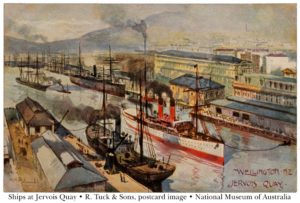 McEldowney had a varied experience of churches while growing up. He would later recall that “When I was about 11 years of age I used to go to a Wesleyan Sunday School, which was about 100 yards from my home. My people were Presbyterians, but my grandmother was more or less an invalid and the Presbyterian Church was too far for her to walk to so she went to the Methodist Church, which meant that I was… at home in both Methodism and Presbyterianism.” As he grew older however, he began to “. . . notice a real difference in the social standing of the Wesleyans compared with the Presbyterian at St. Andrews Church. I had sense to realise that for all their glibness those Methodists had no better characters than the Presbyterians I knew.”
McEldowney had a varied experience of churches while growing up. He would later recall that “When I was about 11 years of age I used to go to a Wesleyan Sunday School, which was about 100 yards from my home. My people were Presbyterians, but my grandmother was more or less an invalid and the Presbyterian Church was too far for her to walk to so she went to the Methodist Church, which meant that I was… at home in both Methodism and Presbyterianism.” As he grew older however, he began to “. . . notice a real difference in the social standing of the Wesleyans compared with the Presbyterian at St. Andrews Church. I had sense to realise that for all their glibness those Methodists had no better characters than the Presbyterians I knew.”
McEldowney was educated at Wellington College for three years; the oldest high school in Wellington, it had been founded by the Governor General in 1853. In 1906 he entered Victoria University College to study law. After completing his first two years of law with very satisfactory results (first class and second class passes) William went into the family firm as an accountant, leaving his law career in abeyance. His sister boarded at Wellington Girls’ College from 1908 to 1911 where she studied art and played sports. She was an outstanding tennis player. She was also a committee member of the Christian Union. After leaving school Iva taught at the boy’s preparatory school established by Miss Somerville, which later became the Anglican Wellesley College. She resigned in 1913 to spend more time on her painting studies before leaving for England in 1914 where she studied at the Slade School of Art.
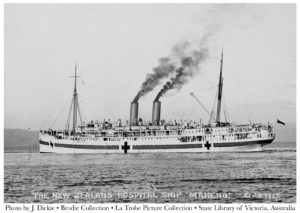 When war broke out in August 1914, McEldowney was 25 years old working as an accountant for McEldowney Brothers. He was in no rush to enlist but when he did, in November 1915, he joined the New Zealand Medical Corps. For the duration of the war he served as an orderly on the Hospital Ship Maheno. The ship had eight wards, two operating theatres, a sterilisation room, X-ray room and laboratory, and could accommodate over 400 wounded or ill patients. The first charter took the ship to Gallipoli, where bullets hit the deck. William joined the ship for its second charter from Egypt to bring patients back to New Zealand. It then sailed to Southampton, England to ferry wounded from France to England during the Battle of the Somme. McEldowney served on all subsequent charters until the war’s end. The Maheno along with its sister hospital ship Marama had transported 47,000 patients by the end of hostilities. During his war service, half of which was spent overseas, McEldowney’s religion of record changed: It was the obligatory Church of England when he enlisted but Congregationalist at war’s end. He was transferred to Napier Hospital in 1918 on active service with the rank of corporal until being discharged in March 1919. Later that year his law degree (LLB) was conferred by the University of New Zealand.
When war broke out in August 1914, McEldowney was 25 years old working as an accountant for McEldowney Brothers. He was in no rush to enlist but when he did, in November 1915, he joined the New Zealand Medical Corps. For the duration of the war he served as an orderly on the Hospital Ship Maheno. The ship had eight wards, two operating theatres, a sterilisation room, X-ray room and laboratory, and could accommodate over 400 wounded or ill patients. The first charter took the ship to Gallipoli, where bullets hit the deck. William joined the ship for its second charter from Egypt to bring patients back to New Zealand. It then sailed to Southampton, England to ferry wounded from France to England during the Battle of the Somme. McEldowney served on all subsequent charters until the war’s end. The Maheno along with its sister hospital ship Marama had transported 47,000 patients by the end of hostilities. During his war service, half of which was spent overseas, McEldowney’s religion of record changed: It was the obligatory Church of England when he enlisted but Congregationalist at war’s end. He was transferred to Napier Hospital in 1918 on active service with the rank of corporal until being discharged in March 1919. Later that year his law degree (LLB) was conferred by the University of New Zealand.
Home in peace time, the newly qualified solicitor decided he no longer wanted to work in the family business so he set about building a law practice. His practice in the centre of Wellington city grew and with its success he began family life, marrying Ida Evaline Daniell in the Methodist Church at Masterton in 1925. The couple travelled to Britain after the wedding for an extended holiday, and their first child Roberta, always known as Bobbie, was born in Kensington, London the following year.
The family returned to New Zealand, and in 1928 another daughter, Helen, was born. Life was good for William and Ida; the children were healthy little girls and William’s law practice continued to prosper. He found time to support his university college, acting as judge and adjudicator for the Victoria University College Debating Society, and was a selector for the national university competition team. He gifted 400 volumes on seventeenth and eighteenth century New Zealand colonial history to the Victoria University College Library. His gift was acknowledged at the same university Council meetings that recorded the donation by Sir Robert Stout of a large number of pamphlets on public issues. Sir Robert had recently retired as New Zealand’s Chief Justice and was President of the Wellington Unitarian Free Church. But disaster was to strike this little family in June 1930 when Ida became ill with aplastic anaemia, a blood disease which had no effective treatment, from which she died that September. Her funeral service was conducted by the Rev. Robert Howie at St Andrews Presbyterian Church, Wellington.
By 1931 McEldowney was an active member of the Wellington Unitarian Free Church. He spoke at community meetings as well as church services in Channing Hall on a monthly basis. His topics included poverty and the slums, theological subjects, the work of the League of Nations, humanism, and political history. He visited Auckland in 1932 and 1933 and gave sermons at the Auckland Unitarian Church. In 1931 William was elected President of the League of Nations Union in Wellington, a position he would occupy until he left for England in 1934. In that capacity he was an advocate for the League and world peace, which he thought could be brought about through the work of the League.
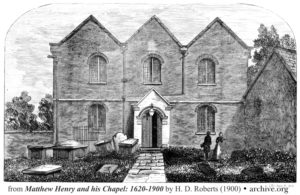 Meanwhile his sister Iva, who had returned from London at the end of the war, was exhibiting her paintings at art society gatherings. Soon she went back to the continent where she studied under M. Emile Renard (1850-1930) and painted in France and Northern Africa. Her work was hung in the Royal Institute of Oil Painters and was greatly admired. By 1932 she was a pupil of the celebrated Dutch artist Miss Jo Koster. Under her tutelage she mastered drawing techniques, finding subjects in Brittany, Holland and the Balearic Islands. While residing in St Ives, Cornwall with Miss Koster, Iva became engaged to Thomas Enoch Williams, MA (Oxon) a master at King’s School, Chester. They were married in December 1933. Like Iva, Tom painted and after their marriage they jointly exhibited.
Meanwhile his sister Iva, who had returned from London at the end of the war, was exhibiting her paintings at art society gatherings. Soon she went back to the continent where she studied under M. Emile Renard (1850-1930) and painted in France and Northern Africa. Her work was hung in the Royal Institute of Oil Painters and was greatly admired. By 1932 she was a pupil of the celebrated Dutch artist Miss Jo Koster. Under her tutelage she mastered drawing techniques, finding subjects in Brittany, Holland and the Balearic Islands. While residing in St Ives, Cornwall with Miss Koster, Iva became engaged to Thomas Enoch Williams, MA (Oxon) a master at King’s School, Chester. They were married in December 1933. Like Iva, Tom painted and after their marriage they jointly exhibited.
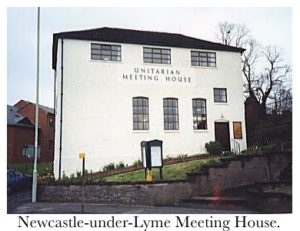 In 1934 after four years active involvement with the Wellington Unitarian Church, McEldowney decided to go to Manchester College, Oxford (Harris Manchester College after 1996) to study for the ministry. In doing so, as a widower with two young daughters, he was influenced by the fact that his sister Iva had already settled in Chester and could help raise the children. He entered the College in October 1934 on his own foundation, without any scholarship and completed his studies over three years. He won the Mansfield-Evans Prize for philosophy at Manchester College. His first ministry was at the High Street Chapel, Warwick. In 1938 he became minister at Matthew Henry’s Chapel, Chester where he remained until 1944. In 1942 he was President of the Chester Free Church Ministers’ Fraternal, indicating the regard in which his colleagues held him. From there he took up the Unitarian ministry at Newcastle-under-Lyme, Staffordshire, where he remained for seven years.
In 1934 after four years active involvement with the Wellington Unitarian Church, McEldowney decided to go to Manchester College, Oxford (Harris Manchester College after 1996) to study for the ministry. In doing so, as a widower with two young daughters, he was influenced by the fact that his sister Iva had already settled in Chester and could help raise the children. He entered the College in October 1934 on his own foundation, without any scholarship and completed his studies over three years. He won the Mansfield-Evans Prize for philosophy at Manchester College. His first ministry was at the High Street Chapel, Warwick. In 1938 he became minister at Matthew Henry’s Chapel, Chester where he remained until 1944. In 1942 he was President of the Chester Free Church Ministers’ Fraternal, indicating the regard in which his colleagues held him. From there he took up the Unitarian ministry at Newcastle-under-Lyme, Staffordshire, where he remained for seven years.
By now his daughters were young adults. McEldowney made a journey back to New Zealand in 1947 with his younger daughter Helen. His eldest daughter Roberta was studying architecture at Liverpool University. In 1949 she married Dr. John McIntyre and they migrated to Canada in 1956. Helen married John Davey a local dentist in 1952. Meanwhile in the 1950 British general election he had stood as a Liberal candidate in the Stafford and Stone electorate, but he only polled a distant third.
McEldowney’s next ministry was at the Westgate Chapel, Lewes, Sussex. This was the chapel where Tom Paine author of the Rights of Man was married. This was his last ministry, 1953-56. In 1956 he retired and returned to Chester. Now he had more time to visit his family in Canada and to write. Between 1952 and 1966 he contributed articles to The Inquirer and Faith and Freedom on subjects ranging from “Katherine Mansfield” to “The Age of Enlightenment and Human Virtues”. His last article was published in 1966 entitled “An Apostle at Grips with Human Existence.” He began writing a major work, Unitarianism in America – From Biblical Literalism to the Authority of Reason and Religious Experience. Alan Seaburg, librarian at the Crane Theological School at Tufts University in Boston, Massachusetts was very helpful with this project. The two first met in 1960 when McEldowney visited the library to do research for the book. Seaburg invited him to dinner, they became friends, and over the next four years they often corresponded about the work. Unfortunately, the book was never completed though some of the research was used in McEldowney’s journal publications.
William McEldowney was a scholarly minister, with interests in Unitarian history and European existentialist philosophy. He made a unique contribution to the British Unitarian movement, being the only New Zealander who trained at Manchester College and then remained for his entire professional career in the United Kingdom. A memorial bowl in his name was donated to the Newcastle-under-Lyme Meeting House.
The Harris Manchester College Library at the University of Oxford in England holds class photographs and college files for McEldowney while the Andover-Harvard Divinity School Archives in Cambridge, Massachusetts have a ministerial file for McEldowney which includes correspondence with Alan Seaburg and draft chapters of McEldowney’s planned book. Correspondence and meeting records are found in the Newcastle-under-Lyme Old Meeting House archives in Newcastle-under-Lyme, Staffordshire, England. Records of McEldowney’s service in the New Zealand Defence Force are in Archives New Zealand Te Rua Mahara O te Kawanatanga (archives.govt.nz). College records were found for New Zealand University Graduates 1870-1961 on-line at shadowsoftime.co.nz.
McEldowney’s journal contributions include, “Unitarian Theism-Is It Christ Centered?” Faith and Freedom (1962); “The Age of Enlightenment and Human Virtues” Faith and Freedom (1963); “Memories and Reflections” The Inquirer (1952); “Early Memories of Worship” The Inquirer (1953); and “An Apostle at Grips with Human Existence” The Inquirer (1966). Alan Seaburg provided a personal reminiscence. Stella Blazier kindly provided typed copies of correspondence concerning WJ McEldowney and minutes of monthly meetings held in the Newcastle-under-Lyme Old Meeting House archives, 1944-1951.
Article by Wayne Facer – posted August 25, 2017